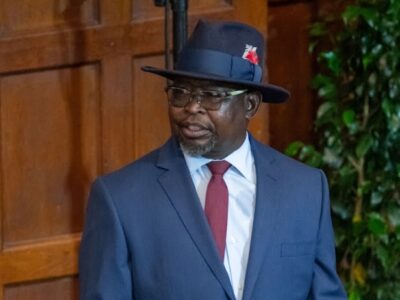
On the eve of its 40th birthday, Ecobank Transnational Incorporated (ETI), the banking group with the largest presence in West and Central Africa, finds itself playing in a very different environment from when it first opened its doors to customers in Lomé, Togo, back in 1985. The banking sector, overrun by technology and catering to a very different type of customer, requires something very different from its service providers. And that’s before the global and public upheavals of the last decade, which have tested financial institutions as much as any other economic players.
Despite this challenging environment, the bank’s recent bond issue was well oversubscribed, indicating that the markets consider the bank to be a healthy proposition. “We went to the market looking for $350m,” CEO Jeremy Awori says of the bond issue, the first from the bank since 2021. Even though there were some doubts about the timing, Awori says the bank was sure about its prospects. “We felt confident and we were clear about our strategy and the story we had to tell. Our backs were not against the wall so we were comfortable with the transaction.”
In the end, the markets returned an enthusiastic vote of confidence, offering $900m, from which the bank took $400m at 10.125% with a due date of 15 October 2029. Awori says the bank was happy with the rates.
“We had a Eurobond a few years ago and the spreads over SOFR [secured overnight financing rate, a broad measure of the cost of borrowing cash] for this were almost 100 points less, which I think is positive because at the end of the day, it’s really about your spread over SOFR.”
“I think the general message that came out of the roadshow was that they like the strategy. They see the opportunities for us and also, assessing the management – right from me to the chief financial officer and the governance, risk and compliance officer – gave them confidence,” he says.
Growth opportunities
Given the current unpredictable environment, it’s understandable why Awori would take pride in the fundraising. In the wake of the pandemic, the supply chain shocks and the wars in Ukraine and the Middle East, capital fled from emerging markets to safer berths in the developed world, especially as central banks in those markets hiked rates to tame runaway inflation. In Africa, debt distress, currency shocks and pockets of instability reinforced negative perceptions about the continent and its economic prospects.
With inflation easing and rates returning to pre-2021 levels, investment instruments in frontier markets may get another look-in. Attracting capital, as ever, will depend on having the right strategy with assurances of growth. Awori argues that Ecobank is in that position. The bank’s focus, he says, is to maximise returns by deploying capital strategically, with an approach centred on growth, returns and transformation. And while capital was traditionally parked in one area to generate consistent returns, the market – and Ecobank along with it – now favours a more dynamic and flexible strategy where capital is reallocated between businesses to capitalise on opportunities that promise stronger returns.
“It’s showing in our results. When we look at our return on tangible equity, it’s almost 33%, which I think is a very strong performance by any stretch of the imagination. We’re seeing growth even in difficult times,” he asserts.
As part of its strategy for growth, Awori says the bank is also moving into new areas, particularly in the consumer and small and medium enterprise (SME) sectors, where it currently has a smaller market share and sees potential.
“We’ve still got big opportunities in the corporate investment banking segment, whether it’s cash management, payments, trade finance, syndications, advisory or treasury services, ” he confirms. However, with a changing consumer base that will become more and more dominated by young and digitally savvy people who want their service providers to adjust to and work around their lifestyle choices, Ecobank could do worse than meet them where they are.
“We’ve got young customers and they want to be able to bank on the go. They need card products and they need savings products. They need investment products and credit products such as mortgages and unsecured loans. And some of them are entrepreneurs,” he points out.
A cornerstone of this approach is the bank’s central IT system. Customers of the bank, in effect, can get the same service they would get at their local branch at any of the over 1,600 other branches spread across 35 African countries.
“Increasingly, we’re seeing our customers moving around. For a lot of banks, what happens is that when you move from one country to the other, there’s no connectivity; they only know you as a customer. We, on the other hand, have the capacity to have staff serve you irrespective of where your original branch is,” he says.
The bank is also confident that growth can come from its payments business, where it is once again leveraging its vast IT systems and the advantage of its reach.
“We can do real-time payments today on our network from people’s phones. You can send money from [Kenyan] shillings to [Zambian] kwacha or kwacha to [Ghanaian] cedi if you need it. And that’s a unique capability” of the bank’s systems, Awori explains.
And the bet on growth is paying off, he says.
“We’re putting capital in there and we are optimising the returns from it. We’re driving our fee income, not just interest income, up. I’m excited we’re getting more customers on board and doing more business with those customers. That’s where it counts. You want to be chosen by your customers as the banking partner of choice.”
In November 2024, ETI signed an agreement with Nium, operators of one of the leading global systems for real-time cross-border payments. Under the deal, ETI will integrate Nium’s real-time payments infrastructure into its own operations, enabling it to offer faster and more efficient international payment services to its customers. The bank said this will result in reduced waiting times and seamless access to payments in over 220 markets, including more than 100 countries. For Nium, partnering with Ecobank means plugging into and playing in 35 new markets in one fell swoop.
Technology focus
Ecobank had also, in June 2023, become one of the first banks to sign on to the Pan African Payment and Settlement System, a collaboration between the African Export-Import Bank and the African Continental Free Trade Area to facilitate cross-border payments across the continent as a fillip to intra-African trade. Awori says these agreements are evidence of how seriously the bank takes digital payments.
“As Ecobank, we want to be one of the leading payments players on the continent,” he declares.
The focus on technology is an indication of the future that Awori envisages for the banking sector and how he intends to steer the bank into it. It is a future in which technology is integral to the delivery of financial services, not just as a tool, but even for determining the nature of the services themselves.
“Customer service and the customer experience is going to be a big differentiator. Understanding your customers is going to be paramount because everyone can offer you an app or a card. The question is, does it work the way you want when you want it to work? Does it serve your needs at that particular point in time?”
That means using data and analytics to better understand the customer and even predicting their needs, thus offering a much more intuitive service. The pace of change, he adds, is only going to get quicker.
“It is astounding how quickly businesses are evolving and you really see the acceleration. You can see a company grow substantially and also just disappear equally as quickly… The rate of change that you would see happen in eight years is now happening in four months. So now the question is as a leader, whereas [previously] you had years to learn, change is happening in months. So leading and dealing with change is a completely new ball game.”
Another way that Awori sees banking changing is in the nature of competition that players will have to contend with. Whereas banks have for much of their existence had to compete with other banks and financial institutions, the explosion in financial technologies means that plucky startups can take food from off the table of well-established institutions. The result, Awori thinks, will be highly specialised providers catering to different ends of the market. “There could be players who are just focused around delivering bancassurance [selling insurance to bank customers]. You might find that telcos are specifically focusing on mobile wallets. There will be firms that are going to deal with credit to just SMEs. When you look at each of these verticals, you don’t just have the regular banks, but you have specific players doing specific things,” he predicts.
For banks, this will be a call to arms as they find ways to remain relevant and protect their bottom lines. Awori believes that there is more than enough room for banks to keep playing. “We have to look at where we can do partnerships,” he suggests, pointing to big-ticket deals as one of the areas where banks can maintain an edge if they work together.
“There are lots of opportunities to syndicate with other players especially when you’re talking about really big projects, because no one bank may be able to do a deal running into billions of dollars.”
In climate finance, sustainability and agriculture, Awori thinks there will be points of opportunity where banks can work together.
Economic headwinds
Of course, the best laid plans can be waylaid by exogenous variables and in the current climate there could be more than a few. Across the continent, fiscal fragility and policy uncertainty remain worries in some areas. Awori says Ecobank’s diverse footprint means that it can retain its commitment even in the face of some of these challenges.
“We are a long-term player and we don’t pull out if things get hard. We’re quite strategically focused around the places we want to play and on how we go about that.”
Overseas, the incoming Trump administration in the US hints at a brutal trade war with China that may upend global trade, with African markets sure to feel the pinch. Should that or other events keep interest rates high, Awori says Ecobank will work to keep rates as low as possible.
“We’ll have to come up with the right partnerships and risk-sharing to keep services affordable. Contrary to what people may think, we’re not trying to just price as high as we can.”
Key to this is keeping costs down, which Awori says is also something that the bank is focused on.
“In my view, we must always focus on being more efficient. There are a lot of frictional costs across the board that we can take out, freeing up money that can be invested in new business growth opportunities, and not just [going] straight to profit.”
Here again, technology is an ally, enabling banks to do much more with fewer resources.
“We’re in a time now where technology allows us to do radically different things in terms of analytic capabilities, models and engines and that is going to probably, over the course of the next five to ten years, drastically change the nature of work done in a bank. Commoditised work will be automated, while value addition work will be done by people.”
Awori can be confident in his forecasts because he already has some wins on the scoreboard.
“I’ll give you an example. When I came in, we had 15 or 16 businesses where the return on equity was higher than the cost of equity. Today, that number is now 26 going to 27. And that’s the reality of a returns-focused business.”
Mission to transform
Ultimately, the mission is to transform the bank, not only through process changes but a continuous improvement in its work culture.
“It is about transforming the way we do things. So you can see transformation around the brand, around the customer experience and rethinking customer journeys to make them simpler.”
The bank has set up transformation offices to keep the effort on track and ensure its execution. But it may yet come down to the people who man the effort.
“By 2030, we’re going to have far more younger employees in the workforce. Their ways of working, what motivates them, how to keep them engaged, has to adapt. If you keep with the old ways of working, you’ll never keep the best people,” he observes.
In an environment where some of the biggest names in global business are competing for local talent, Ecobank’s ability to attract the best may well define its future.










Comments